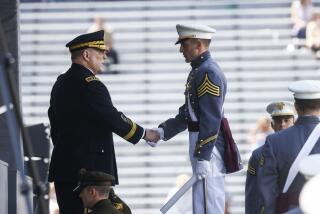Gates says force, high technology have their limits
- Share via
WASHINGTON — Americans should hold modest expectations about how much can be accomplished through military action and remain skeptical about the benefit to the armed services of technological improvements, Defense Secretary Robert M. Gates said Monday.
In an address to students and faculty at National Defense University, he said the Pentagon had erred by favoring complex weapons systems that take years to develop. Instead, he said, the military should look for the “75% solution,” favoring less advanced technologies that could make an immediate difference in Iraq and Afghanistan.
Gates’ remarks were in sharp contrast to the views of his predecessor, Donald H. Rumsfeld, who believed that high-technology advances could help shorten wars and allow conflicts to be fought with ever fewer forces.
“Be modest about what military force can accomplish and what technology can accomplish,” Gates said.
He urged his audience to have an “appreciation of limits” of military power, arguing that although the U.S. has achieved huge advances in targeting and intelligence that have made attacks more precise, warfare is “inevitably tragic, inefficient and uncertain.”
The comments amounted to a critique of a military theory called “effects-based operations,” which argues in part that the government can carefully craft military interventions to have a predictable effect.
“Look askance at idealized, triumphalist or ethnocentric notions of future conflict that aspire to upend the immutable principles of war: where the enemy is killed, but our troops and innocent civilians are spared,” he said.
Noting Russia’s use of cyber-assaults alongside its conventional attack on Georgia, as well as Saddam Hussein’s use of tanks along with irregular forces in Iraq, Gates said the categories of war -- regular and asymmetric -- are blurring.
“We can expect to see more tools and tactics of destruction, from the sophisticated to the simple, being employed simultaneously in hybrid and more complex forms of warfare,” he said.
But the military, he said, has not been agile when it comes to developing new weapons for nonconventional wars.
In the past, Gates has criticized the Pentagon’s focus on building expensive weapons systems meant primarily for large conventional fights. On Monday, he said such systems are important -- but so are less complex weapons that can be quickly sent into battle.
Gates said the Pentagon must find a way to make sure that, in future conflicts, officers do not have to fight the bureaucracy to quickly develop and field needed weapons.
“My fundamental concern,” he said, “is that there is not commensurate institutional support -- including in the Pentagon -- for the capabilities needed to win the wars we are in and of the kinds of missions we are most likely to undertake in the future.”
--
More to Read
Sign up for Essential California
The most important California stories and recommendations in your inbox every morning.
You may occasionally receive promotional content from the Los Angeles Times.











